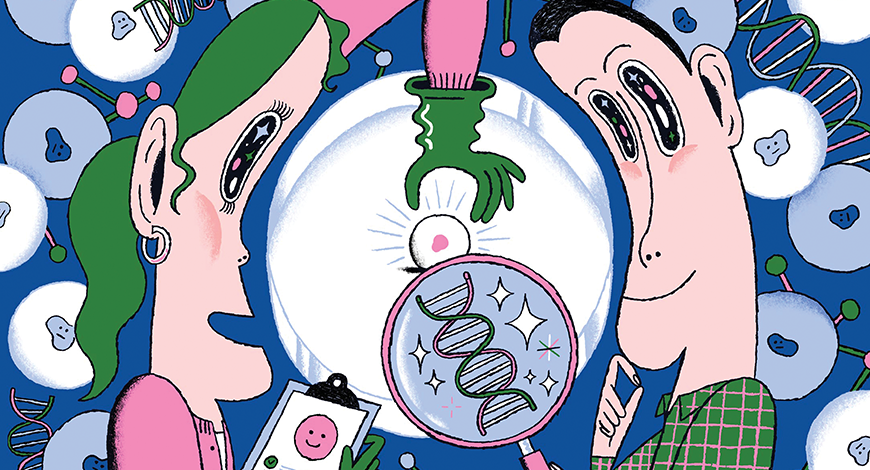Industry
Next generation of IVF treatment

Technological advances, new fertility treatments, high success rate, and increasing demand for IVF treatment in India is driving the growth of IVF in the country.
To be a parent is a dream of every couple, but for some it can be challenging. Infertility is a major cause of concern, and nearly 1 out of 6 people worldwide suffer from infertility during their reproductive lifespan. Fortunately, IVF has provided a ray of hope to couples by helping them achieve their dream of starting a family.
Thanks to the technological advances in IVF and fertility treatments, experts have seen high success rate in IVF in recent years. IVF has undergone significant changes and innovations in recent times, leading to better outcomes and expanded treatment options for patients. The onus of this success goes to the development in genetic tests that are becoming increasingly relevant in the reproductive medicine.
Albeit a complex procedure, it is essential for the couples to know that their child is healthy and normal, which can only be possible through genetic testing. Most gynecologists recommend it to women above 35 years of age and undergoing IVF treatment. The need arises for couples in instances when previous child was born with genetic disorder, or have a history of recurring failure in IVF cycles or miscarriages. Genetic testing provides a direction toward the most appropriate assisted-reproductive technique.
Role of genetic testing
There are multiple factors that are to be considered before implanting a fertilized and a healthy embryo for a successful IVF cycle and pregnancy. Genetic testing is the only option that helps determine the success rate and the birth of a normal and healthy child. Fertility science and assisted-reproductive technology (ART) have evolved over the years. Other options like intracytoplasmic sperm injection (ICSI), frozen embryo transfer (FET), and third-party reproduction are available to enjoy parenthood for the childless couples.
PGT
The recent development in ART is pre-implantation genetic testing (PGT), which assesses the genetic profile of an embryo before it is implanted into the mother’s uterus, thereby increasing the chances of a healthy baby. PGT was earlier known as pre-implantation genetic diagnosis (PGD) and pre-implantation genetic screening (PGS).
Currently, PGT is performed by removing and testing trophectoderm cells from the developing blastocyst. It is done only after 5 to 6 days after oocytes retrieval. A number of analyses are later performed on the developing cells, depending on the purpose. PGT has several different applications, including testing for aneuploidy (PGT-A) (aneuploidy are chromosomal abnormalities), monogenic disease (PGT-M), and structural rearrangements (PGT-SR). One of the new applications has also evolved recently PGT-M, which involves screening of polygenic conditions.
Several non-invasive and high-throughput assays have been developed to help overcome the challenges encountered in the conventional invasive biopsy and low-throughput analysis in PGD/PGS.
NGS, one of the techniques under which all 24 chromosomes are screened in a developing embryo, helps scientists to select only embryos with a healthy chromosome profile to transfer. It is likely to replace other technologies as the predominant method for PGT due to lower cost and reduced errors. Enhanced detection of structural abnormalities like chromosomes with missing or duplicate segments, ability to detect when an embryo may have cells with differing results (mosaicism), and reduction of human errors by increasing use of automation are some of the potential advantages of using NGS. NGS has revolutionized reproductive health research with a high-throughput technology for rapidly sequencing DNA, with high accuracy. Ion torrent NGS solutions deliver scalable, precise sequencing for better reproductive health outcomes.
Newer techniques for genetic assessment
Polymerase chain reaction (PCR) and fluorescent in situ hybridization (FISH) are the two main techniques used for genetic assessment. Under PCR, multiple copies of the specific gene are made by the process of amplification, which allows for the identification of tiny amounts of DNA, enabling a diagnosis.
FISH allows the exact number of chromosomes in an isolated cell to be counted. Scientists can use this to detect abnormalities in chromosome number, like Down syndrome, as well as translocations, which are defects in the chromosomal structure.
Recent developments
There are several innovations that have been developed to improve health outcomes and success rate in 2023. These include:
Stem cell treatment has been gaining popularity in the field of IVF recently. The researchers are exploring their potential to improve fertility and pregnancy outcomes. Stem cells are harvested primarily from fat tissues or bone marrow. To replace the damaged cells, the doctor collects healthy stem cells and injects them into the mother. These totipotent stem cells, as they are referred to, renew and self-place themselves in damaged areas of the body that need rejuvenation and rebuilding.
Laser-assisted hatching is widely adopted in recent times. Assisted hatching has shown positive results and the success rate has been tremendous in specific patient groups like those with poor embryo quality or advanced maternal age.
Embryoscope is also known as time-lapse imaging. Under this technique, the doctor monitors the development of embryos in real time and select the most viable ones for transfer. The embryoscope takes multiple photographs of the embryo after 10 minutes and then creates a mini time-lapse video, which helps the doctor to track the cell division and progress of each embryo. Hence, the best embryo is then selected to implant in the mother.
Technological advancements
Technology is playing a crucial role in IVF treatments today.
Artificial intelligence is increasingly becoming popular. From fertilization to the blastocyst stage, AI may help in ongoing forecasts by integrating with time-lapse imaging (TLI) technologies.
Studies have found that AI can improve the success rate of IVF by helping doctors select the best embryos for transfer and reduce the risk of miscarriage. While the use of AI in IVF is still in its nascent stages, it shows promise.
Robotic technology. Intracytoplasmic sperm injection (ICSI) has become more automated because of the recent advances in robotics and nanotechnology. These technologies allow for real-time analysis of oocyte penetration, enabling doctors to select the best sperm or embryo for a specific situation. The use of nanotechnology has enabled suitable sperm cells to be chosen, leading to the development of a healthy embryo.
Demand for IVF in India
The demand for IVF in India has been increasing steadily. The market for IVF treatment in the country was valued at USD 478.2 million in 2018, and it is expected to reach USD 1453.0 million by 2026, with a compound annual growth rate of 14.7 percent.
The fertility space in India has gone up 20 percent in the last five years, as per a report by Ernst and Young. Globally, over 2.5 million cycles are being performed every year, whereas in India, it is only 2–2.5 lakh IVF cycles that are performed every year. The future of the IVF industry in India is promising with a potential of doing 5–6 lakh IVF cycles.
India is one of the most affordable destinations for IVF and other infertility treatments in the world. The country has more than 500 individual IVF centers. As compared to US, the cost of the treatment in India is 90 percent less than in the US (USD 2500 versus USD 12,000).
Outlook
The increasing demand for IVF treatment in the country is pushing the genetic testing to a great extent. It helps understand the history of recurring failure in IVF cycles and miscarriages.
Genetic testing in infertility treatment
 Dr Shipra Thukral
Dr Shipra Thukral
Country General Manager,
Origio India Pvt. Ltd. – A CooperSurgical Company
As per the recent report published by the WHO, around 17.5 percent of the adult population – roughly 1 in 6 worldwide – experience infertility, and when it comes to India, it is home to almost 28 million infertile couples. With the growing infertility market, there are newer tests, equipment, and technologies, which are driving the trust in this segment. One such test is the genetic testing of embryonic cells, commonly known as pre-implantation genetic testing (PGT). It is a cutting-edge procedure used to identify genetic abnormalities in embryos created with artificial reproductive technologies (ART). It allows the infertility specialists to select embryos predicted to be free of any specific genetic condition or chromosomal abnormalities for transfer into the uterus.
Genetic testing in ART has been in play for quite some time now. As per our internal market research, the prevailing numbers for these tests would be approximately between 5 percent and 10 percent of the total ART seeking couples. The need for genetic testing is increasing rapidly due to the advancement in maternal age, increasing male factor issues, and the rising cases of recurrent implantation failure & pregnancy loss. It is also highly recommended in cases of family history of genetic disorders.
There are different genetic tests serving different purposes within the gamut of manifested genetic abnormalities. However, there are many challenges facing this segment, one of which is the skill availability for doing a good biopsy. There is also a challenge when it comes to the test report communication to patients, as the reports are quite complicated to understand. Also, most of these reports have subjectivity (human interpretation) involved. We hope to see an advent of AI-based reports on these genetic tests to make the life of genetic counsellors easy, and reports more dependable.
However, what is interesting is the growing awareness amongst patients who would at times pro-actively seek more information on these tests. The next-generation sequencing platforms have only made testing more easy, more affordable, and widely available.
We at CooperSurgical offer the globally pioneering family of genetic tests, innovative AI platform that helps improve accuracy, and an extensive team of global and board-certified genetic counselors to provide personalized support to the infertility specialists and IVF seeking couples.











